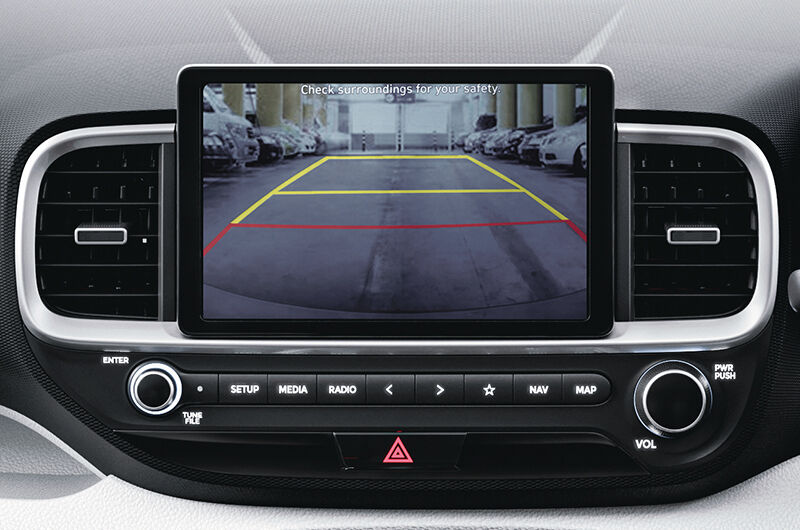Driving a car is one thing, but parking it is another job. In fact, parking might be the most tiresome process in driving for a good majority. With the exploding number of cars on the road these days, finding a spot and maneuvering into it can feel daunting. Parking a car involves a fair amount of calculation and it also depends on the dimensions of the car you’re driving and how well-versed you are about the same. It is absolutely normal to struggle with parking, as even the most ardent drivers can sometimes get this wrong.
But, thanks to the advancements in technology around cars, there exists a handful of parking assistance systems and features that will help you navigate through this laborious process. These include something as basic as a parking sensor with a warning sound to a full-blown automatic hands-free park assist where the car parks itself. Yes, technology has come a long way and in this day and age where cars can drive themselves, self-parking cars are increasingly becoming popular.
Types Of Car Parking Assistance Systems
Table of Contents
Parking Sensors
The most basic form of park assist comes in the form of parking sensors which are fixed into the car’s bumpers, both front and rear. Rear parking sensors are more common since rearward visibility and reversing are the two main challenges of parking a car. When activated or put into reverse, these ultrasonic sensors emit waves that detect any obstruction and trigger an increasingly intense beep sound as an obstacle gets closer. Cost-effective and reliable, parking sensors thus act as a safety net, alerting us to potential hazards and preventing accidents.

A more advanced version of the parking sensors also comes with a display which indicates the distance to the obstruction. Some parking sensor systems even feature a basic display of the car’s silhouette with bars or graphics that indicate the distance between the car and the nearest surface. These advanced parking sensors are really helpful as it helps us gauge the exact space available for a precise parking experience.
Limitations Of Parking Sensors
- Although parking sensors are fairly accurate, one cannot fully depend on them as they might miss some objects that are low lying on the ground.
- For parking sensors to work properly, the sensor surface should be clear of any dirt or muck.
- Parking sensors have a tendency to fall off from the bumpers and they can also malfunction due to corrosion or buildup of moisture.
Rear Parking Camera
The rear parking camera works on the same principle as parking sensors but offers a foolproof method, as it gives you a live feed of the rear or front end of the car (if equipped). Unlike parking sensors, the rear parking camera provides a more helpful visual assessment of the available space, surface condition, and surroundings. It can detect low-lying objects and identify poor surfaces. That said, the system is passive, and the driver must remain vigilant for anything obstructive.

Some parking cameras come equipped with advanced visual graphics, including bending guidelines that help you steer the vehicle into a narrow gap with more accuracy. These bending guidelines dynamically adjust in real time as you turn the steering wheel, providing an accurate representation of the expected angle and route the car is going to take. Overall, a parking camera is a great addition that gives you that extra bit of confidence to park.
Limitations Of Parking Cameras
- Parking cameras have blindspots which need to be accounted for while parking.
- Some parking cameras offer poor visibility at night and in low-light conditions.
- The camera lens should be clean in order to provide a crisp visual.
360-degree Camera
The 360-degree camera is an increasingly popular and important safety feature that is finding its way into more affordable cars today. A 360-degree camera, as the name suggests gives you a bird’s eye view of the car’s surroundings, making parking and manoeuvring effortless. Multiple cameras are strategically installed on the car, which can pull up individual feeds or a complete 360-degree feed from the top or even other angles depending on the system. It uses technologies like image processing and advanced graphics to display a feed that is complete with a full-scale model of the car.

More advanced 360-degree cameras in expensive cars are also able to render the surroundings in real-time for the best assistance while parking. 360-degree cameras are also prominently used in full-size SUVs as they support off-roading. SUVs such as the Land Rover Range Rover also come with an extra underbody camera system known as ClearSight ground vision.
Limitations Of 360-degree Cameras
- 360-degree cameras are more commonly offered in expensive models or range-topping variants.
- Lens distortion and camera angles can alter the image feed and misrepresent the actual size of an obstruction.
Advanced Park Assist Systems
Advanced/intelligent park assist systems are the epitome of parking assistance technology in today’s times. Currently exclusive to expensive luxury cars in India, these systems work by combining many other assistance systems such as 360-degree cameras and various sensors. The car incorporates a built-in advanced computing system that finds and analyses parking spots in real time. Upon driver approval, the car steers itself into the aforementioned spot while the driver only has to control the acceleration and braking of the car. The car assumes full control of steering, making parking an autonomous process with minimal interaction from the driver. Advanced park assist systems can effortlessly handle normal bay parking or even difficult parallel parking.

The advanced park assist system is a great workaround for those who find the process of parking a car tedious. The systems along with the car will do the heavy lifting and you just have to monitor everything and be alert while it carries on with the process.
Limitations Of Advanced Park Assist Systems
- One should always be alert during the whole parking process.
- Although it is a well-engineered tech, there is always a chance of something going wrong as it depends on various sensors and cameras.
Summary
No matter how we sugar coat it, parking is indeed a demanding process that requires hands-on control and full attention. However, with the increasing availability of park assist systems today, parking can become a breeze. Even basic features like parking sensors add to the experience and ensure a safer process, thereby reducing stress and eliminating risk. Other safety assists such as rear cameras and 360-degree cameras provide an extra layer of protection, enhancing the safety net during parking. The intelligent and advanced parking assists are the best systems out there for anyone who loathes parking and finds this process challenging. These systems have come a long way over the last decade, and with cars ever so growing in size, all these parking assist systems have become integral safety features that cannot be skipped.




